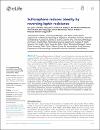Sulforaphane reduces obesity by reversing leptin resistance.
| المؤلف | Çakır, Işın |
| المؤلف | Lining Pan, Pauline |
| المؤلف | Hadley, Colleen K |
| المؤلف | El-Gamal, Abdulrahman |
| المؤلف | Fadel, Amina |
| المؤلف | Elsayegh, Dina |
| المؤلف | Mohamed, Omnia |
| المؤلف | Rizk, Nasser M |
| المؤلف | Ghamari-Langroudi, Masoud |
| تاريخ الإتاحة | 2022-03-28T05:37:13Z |
| تاريخ النشر | 2022-03-24 |
| اسم المنشور | eLife |
| المعرّف | http://dx.doi.org/10.7554/eLife.67368 |
| الملخص | The ascending prevalence of obesity in recent decades is commonly associated with soaring morbidity and mortality rates, resulting in increased health-care costs and decreased quality of life. A systemic state of stress characterized by low-grade inflammation and pathological formation of reactive oxygen species (ROS) usually manifests in obesity. The transcription factor nuclear factor erythroid-derived 2-like 2 (NRF2) is the master regulator of the redox homeostasis and plays a critical role in the resolution of inflammation. Here, we show that the natural isothiocyanate and potent NRF2 activator sulforaphane reverses diet-induced obesity through a predominantly, but not exclusively, NRF2-dependent mechanism that requires a functional leptin receptor signaling and hyperleptinemia. Sulforaphane does not reduce the body weight or food intake of lean mice but induces an anorectic response when coadministered with exogenous leptin. Leptin-deficient mice and leptin receptor mutant mice display resistance to the weight-reducing effect of sulforaphane, supporting the conclusion that the antiobesity effect of sulforaphane requires functional leptin receptor signaling. Furthermore, our results suggest the skeletal muscle as the most notable site of action of sulforaphane whose peripheral NRF2 action signals to alleviate leptin resistance. Transcriptional profiling of six major metabolically relevant tissues highlights that sulforaphane suppresses fatty acid synthesis while promoting ribosome biogenesis, reducing ROS accumulation, and resolving inflammation, therefore representing a unique transcriptional program that leads to protection from obesity. Our findings argue for clinical evaluation of sulforaphane for weight loss and obesity-associated metabolic disorders. |
| راعي المشروع | Qatar National Research Fund (NPRP9-351-3-075) |
| اللغة | en |
| الناشر | eLife Sciences Publications |
| الموضوع | NRF2 activators body weight isothiocyanate leptin sensitizers medicine mouse obesity sulforaphane |
| النوع | Article |
| رقم المجلد | 11 |
| ESSN | 2050-084X |
الملفات في هذه التسجيلة
هذه التسجيلة تظهر في المجموعات التالية
-
أبحاث مركز البحوث الحيوية الطبية [838 items ]
-
العلوم الحيوية الطبية [847 items ]


